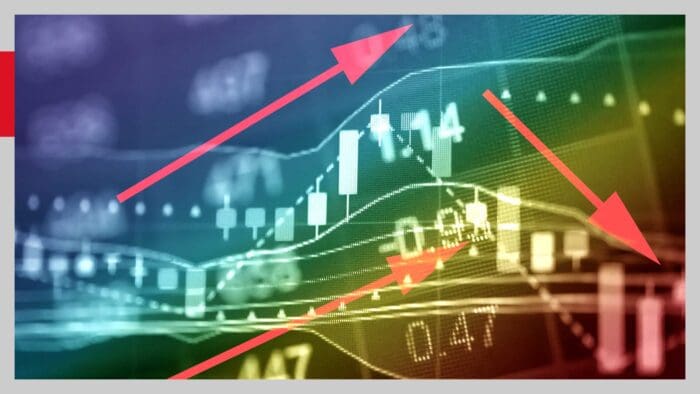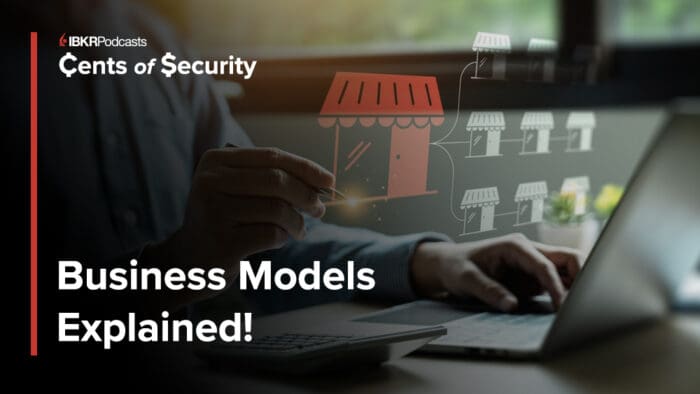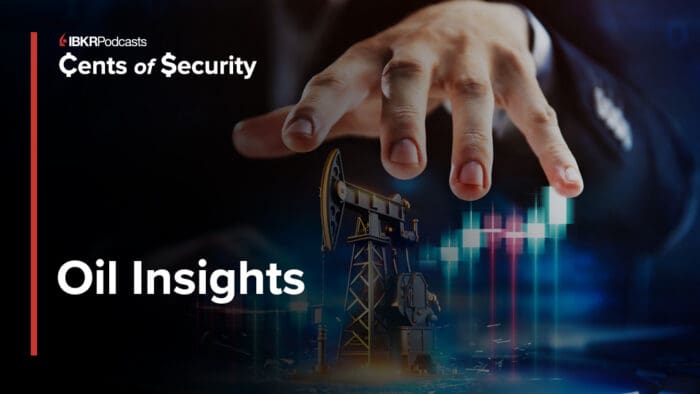There is a lot more to oil investing than just the price you see at the gas pump. How can one get started investing in the oil market? What impacts the price of oil economically and in terms of regulation? We discuss all that and more in this episode.
Summary – Cents of Security Podcasts Ep. 65
The following is a summary of a live audio recording and may contain errors in spelling or grammar. Although IBKR has edited for clarity no material changes have been made.
Cassidy Clement:
Welcome back to the Cents of Security podcast. I’m Cassidy Clement, Senior Manager of SEO and Content here at Interactive Brokers, and today I’m your host for the podcast. Our guest is Caleb Silver, Editor-in-Chief at Investipedia.
There’s a lot more to oil investing than just the prices that you see at the gas pump but how can one get started investing in this market? What impacts the price of oil, both economically and in terms of regulation? We’re going to discuss all that and more, today, in this episode. Welcome back to the show, Caleb.
Caleb Silver:
Glad to be here, thanks for having me.
Cassidy Clement:
Sure. So, you know, when we’re talking about the oil market, most people are thinking maybe oil they get for their house, or the most common, of course, is gas at the pump for your car. But what actually makes a potential investment into the oil market? Is it a futures contract? A stock of oil companies? Bonds of oil companies? Could it be all of that and more? What say you?
Caleb Silver:
Yeah, there’s so many manifestations of ways that investors can approach investing in the oil market or the oil ecosystem. Let’s just list some of the major ways. Oil as a commodity, right? Oil as then refined into gasoline. Oil as a source of products like fertilizer, like petroleum based products, like oil used in aviation.
So oil has many different use cases. As an investor, we can invest in oil by buying the commodity itself, by buying a futures contract, which we’ll get into in a couple of minutes, by investing in the companies that drill for oil or sell oil or refine oil, or are second market redistributors of oil. Or, the companies that benefit from the production of oil, and that could be the drillers, that could be the shippers, that could be the storage tanks.
There are so many different ways to approach the market. Most people, though, when they think about investing in oil, they’re thinking about investing in the companies that produce it, drill it, the explorers and producers, we say, or they’re thinking about investing in the commodity and buying futures contracts on the commodity itself.
Cassidy Clement:
So when we’re talking about the Futures Commodity, and then I guess you had also said there’s a few mix of a handful of other investments, but what really can impact those prices of the contracts and then the actual commodity itself? Most people, at least within the past few years, would say, oh, well, there’s environmental concern, or there may be a political change that maybe impacts the regulation on that. What are the main like drivers, I guess you can say, within designating the prices to these different securities that fit oil companies and the commodity itself?
Caleb Silver:
Good question. At its most basic level, oil is a commodity. It has a scarcity to it, but it is subject to the laws of supply and demand. The more demand, the higher prices typically go. The less supply, the more constrained supply, especially when there is demand, the higher prices usually go. But oil is also subject to disruptions because we have to drill for it underneath the ground or underneath the ocean.
And a lot of the oil is produced in zones and areas around the world where there’s a lot of conflict. A lot of the oil comes out of the Middle East. We have a lot of conflict there across different countries and different territories. And a lot of oil is produced in the Russia and Ukraine area, where we have another conflict. So when you have conflicts in these areas or wars or supply disruptions, that could impact price, but nothing impacts price more than demand. The more we need, the higher the price usually goes.
Cassidy Clement:
So oil itself, we’ll say as a market sector, does it have a quick reaction within its securities to other influences or is it more a slow burn, if you will? Because as you said, it’s like, okay, we need all this oil right now and then it takes time to get it from point A to point B all the way to usage. When some people read headlines, they’ll say like, oh, in a couple of months you’ll see this, you’ll be paying for this at the pump or something like that. Is the impact to this market a slow burn or is it like a very quick shock?
Caleb Silver:
Great question. Because oil is a commodity that is traded pretty much 24 hours a day, most days of the week, it is subject to price shocks on the spot price. That is the price at which oil is priced at that moment. But oil is typically bought in what we call the futures market. We’re always paying for a future barrel of oil when we think about buying oil or buying oil, the commodity. We’re paying for a future price. So you often see oil priced out into the future several months at a time. Now, how do we know what the price is going to be in the future? We don’t, but , there’s a calculation that goes on behind seasonality, demand, how much is being produced by oil producers or oil producing nations or cartels like OPEC.
So you can kind of tell where prices are going to go outside of a black swan type of an event like a war or like a COVID 19 pandemic, which can severely impact the price. So we’re always betting on the future price. When you look at the pump, the price you pay at the pump in gas is a product of oil, right?
About two thirds of a gallon of gas really comes from crude oil, plus all the other things that goes into gasoline but the effect is It takes place a little bit later. So if oil prices shoot up because of a conflict, or because of a supply disruption, or a big barge gets stuck in the Suez Canal, as happened a few years ago, you will see gas prices affected not the next day, but usually two weeks later. There’s a lag in the retail market for the byproducts of oil, but the spot price of oil may spike 5, 10, 15 percent in one day. We don’t feel it on the byproduct until several weeks later.
Cassidy Clement:
When it comes to the supply aspect, kind of like you’re talking about how, okay, well, we know that demand’s this high, we have this supply that’s supposed to get to you, give or take anything that happens in that time. About two weeks later from that point, you may see the price reflection, but for designation of how much supply is needed outside of demand and such, because as we know, a lot of people would love gasoline to be cheaper.
There’s a huge demand for it, but that doesn’t necessarily reflect in the supply. So are there certain types of regulating bodies or rules or supply restrictions that happen on this market. And I mean, I know from my research and my line of work, OPEC is the biggest word that gets thrown around anytime there’s some talk of supply and demand with oil, but is there anything else other than OPEC, or are they the main group?
Caleb Silver:
Yeah, well, there’s OPEC, the big cartel. That’s the Organization of Petroleum Export Countries, and the United States is not a member of that. And then there’s OPEC Plus, which is allies and other countries that are associated with OPEC, but not necessarily members of OPEC. Russia is a part of that organization. The United States is not. They control supply and production in the territories where their countries operate. So, Russia, Iran, Iraq, Saudi Arabia, etc, they do not control production in the United States. The United States controls production through the Department of Energy, right? And so the Department of Energy, along with whatever administration happens to be in the White House, has control over what we call the Strategic Petroleum Reserves, right?
We bury Millions of gallons of gasoline and oil under the ground throughout this country in case we need it in an emergency. And we’ve needed it in some emergencies where you’ll hear about a president releasing, you know, 1 percent of the SPR to put more supply on the market to bring prices down.
When prices were sky high a couple of years ago, we were releasing barrels of oil in order to bring price down. So we can do that within the United States and the United States produces about half of the oil and therefore the gas that it needs for our daily operations, both through companies and as individuals and households. That said, we are impacted by the global supply chain of oil. So when you have a war in the Middle East or you have war between Russia and Ukraine, Russia and Ukraine is 10 percent of the market. We’re going to feel the effects of tighter supplies in our market here as long as demand remains the same.
Cassidy Clement:
While you’re talking about, we’ll say, in house preserves, for the U. S. of oil and the refinement and, you know, industrialization of it all, what happens when we’re talking about, from a micro view, the U. S. government impacting the oil markets.? And what I mean by that is, are there some examples that you can give of how the market sometimes reacts to these regulatory changes or how they react to a lessening in policy versus a tightening, because over the past several years, solar technology and all these other technologies have come into play and they’ve not only entered the markets, but they’ve also entered some of our public policy.
Caleb Silver:
Great point. So, the use of renewables will have an impact on the demand for oil. So if you think about how much oil we use or how much oil or natural gas we use to convert it to electricity, to put the lights on in our homes and in our businesses, if you can get a lot of that power from solar, that’s going to reduce your demand for that oil or that natural gas.
Similarly, wind, wind turbines produce a fair amount of electricity that you could power, you know, your home with, or you could power small towns with and get a percentage of their energy from renewables. So when you have a big bill pass through, and get signed by the government or get signed by the president, like the Inflation Reduction Act, which was really a climate bill in disguise. There’s much more climate in there than there is inflation. Well, that gives tax breaks to electric vehicles. That gives tax breaks, to using solar. That gives tax breaks to buying electric vehicles, to building charging stations. That will definitely impact the price of oil, but not immediately. So, as consumers, we don’t feel it right away, but we do have options if we want to use things other than fossil fuel. Once those renewables become a more dominant supplier of the energy needs we have in this country, you will definitely feel the impact on that. But we are so reliant still on fossil fuels for just about everything we do in this country, we’re a long way before that happens.
Cassidy Clement:
Yeah, I can honestly say at least, outside of where our office is, the greater New York City area, you know, there’s not as many of, the EV chargers as there is around here throughout most of America. A lot of the smaller towns or the farm towns, they’re still working with oil. It’s the main gig there.
Caleb Silver:
I just saw some wind farms, though. I just saw some wind turbines off of the southern part of Brooklyn out in the water, so I think we’re starting to build more here.
Cassidy Clement:
Yeah, definitely, I think the cityscape starts to embrace it a lot quicker, especially with a lot of vehicle rental places. You can get EVs now. So it’s definitely, you’re starting to see a little bit of an economic change there, but we’re mentioning so many different pieces of what’s a very broad, very closely watched market for probably like over a hundred years at this point.
And to most investors just getting into the space, what are some things that investors should keep in mind when creating any type of strategy or investing in oil products? Because on the surface, it seems like I said, very A to B. We use this a lot. It could be a good investment. but the caveats and the different complexities that go into this market is pretty intense.
Caleb Silver:
Absolutely. And you got to think about investing in oil or oil related assets or securities by thinking about demand, right? Where do you think prices are going in the future? If you believe, and you have research and evidence to support this, that prices will go up in the future, well, then you can usually expect the prices of the securities that track oil, or the companies that drill for oil, or sell it, or transport it, to go up as well. Demand lifts prices, not just in the commodity itself, or in the spot price, but in the companies that are operating in and around that commodity. So when you think about the exploration and production companies, well, they have these multi billion dollar projects around the world, underwater, up in the Arctic, everywhere you could possibly dig for oil. These take many, many years before they start producing oil that will actually make them money. Most oil companies, the explorers and producers, they’re profitable when oil is about $50 per barrel. Well, oil is above $50 per barrel now, and it has been for quite some time, but there are times when oil prices can fall, like the COVID pandemic is a good example.
We just weren’t using it. When demand looks like it’s going to wane, you know that the price of oil is going to go down and the securities that are associated with it are going to go down as well. But that’s what affects price and that’s what affects the prices of stocks that track these things.
But there are different ways to access the market as an individual investor. You can invest in the common stocks of the explorers and the producers. You can invest in the common stocks of the refiners. You can invest in the common stocks of the retail gas companies that sell it to us at the pump or pump it into our homes. But you can also invest, again, in the alternative aspects of the oil and gas market, and that could be investing in land rights, or drilling rights through what we call Master Limited Partnerships, a much more complex way of investing. You don’t own the land, you own the rights, and you get paid for the usage of those rights, but those are available to retail investors.
You can invest in the futures market by buying oil contracts or derivatives out into the future, betting the price is either going to go up or down. That’s a way to access the market. A lot of people do it that way. Or you can invest in companies that are associated with the oil market but don’t necessarily drill for it, don’t necessarily refine for it, but they are involved because they’re either fertilizer companies or they use petroleum or they manufacture petroleum based products that use oil as its main ingredient.
Cassidy Clement:
So there’s a ton of ways to get exposure essentially to the market itself because most things, you know, you have your handful of items, but because oil is so vastly used, you can enter the market in 10 plus different ways.
Caleb Silver:
Oh more than 10, I didn’t even mention exchange traded funds or products or index funds that just track the oil market or companies. Private companies or private market companies that are very tied into the oil and gas space. Those are becoming available to individual investors through interval funds. There are many ways and there will be many more as if you could securitize it, they will, and you can invest in oil and gas in a variety of ways.
Cassidy Clement:
Yeah, I mean, especially as somebody, who, you know, came from a place in the country where there was a lot of farms and I grew up in the coal region, so I’ve seen a lot of people who rely on oil and now even when I go back to see my family, it’s still heavily that over EVs, but you know, as time goes on, I guess it’ll start to change. But thanks so much for joining us. You brought up some great points today.
Caleb Silver:
My pleasure.
Cassidy Clement:
Sure. So as always, listeners can learn more about an array of financial topics for free at Interactive Brokers and IBKRCampus.com. Feel free to leave us a rating or review and follow us on your favorite podcast network. Thanks for listening.
Join The Conversation
If you have a general question, it may already be covered in our FAQs. If you have an account-specific question or concern, please reach out to Client Services.
Leave a Reply
Disclosure: Investopedia
Investopedia.com: The comments, opinions and analyses expressed herein are for informational purposes only and should not be considered individual investment advice or recommendations to invest in any security or to adopt any investment strategy. While we believe the information provided herein is reliable, we do not warrant its accuracy or completeness. The views and strategies described on our content may not be suitable for all investors. Because market and economic conditions are subject to rapid change, all comments, opinions and analyses contained within our content are rendered as of the date of the posting and may change without notice. The material is not intended as a complete analysis of every material fact regarding any country, region, market, industry, investment or strategy. This information is intended for US residents only.
Disclosure: Interactive Brokers
Information posted on IBKR Campus that is provided by third-parties does NOT constitute a recommendation that you should contract for the services of that third party. Third-party participants who contribute to IBKR Campus are independent of Interactive Brokers and Interactive Brokers does not make any representations or warranties concerning the services offered, their past or future performance, or the accuracy of the information provided by the third party. Past performance is no guarantee of future results.
This material is from Investopedia and is being posted with its permission. The views expressed in this material are solely those of the author and/or Investopedia and Interactive Brokers is not endorsing or recommending any investment or trading discussed in the material. This material is not and should not be construed as an offer to buy or sell any security. It should not be construed as research or investment advice or a recommendation to buy, sell or hold any security or commodity. This material does not and is not intended to take into account the particular financial conditions, investment objectives or requirements of individual customers. Before acting on this material, you should consider whether it is suitable for your particular circumstances and, as necessary, seek professional advice.
Disclosure: ETFs
Any discussion or mention of an ETF is not to be construed as recommendation, promotion or solicitation. All investors should review and consider associated investment risks, charges and expenses of the investment company or fund prior to investing. Before acting on this material, you should consider whether it is suitable for your particular circumstances and, as necessary, seek professional advice.
Disclosure: Alternative Investments
Alternative investments can be highly illiquid, are speculative and may not be suitable for all investors. Investing in Alternative investments is only intended for experienced and sophisticated investors who have a high risk tolerance. Investors should carefully review and consider potential risks before investing. Significant risks may include but are not limited to the loss of all or a portion of an investment due to leverage; lack of liquidity; volatility of returns; restrictions on transferring of interests in a fund; lower diversification; complex tax structures; reduced regulation and higher fees.
Disclosure: Futures Trading
Futures are not suitable for all investors. The amount you may lose may be greater than your initial investment. Before trading futures, please read the CFTC Risk Disclosure. A copy and additional information are available at ibkr.com.



















Nothing like stating the obvious! One thing you didn’t mention is the lack of capital investment in oil and gas production over the past decade due to government restrictions and the whole Green Scam.